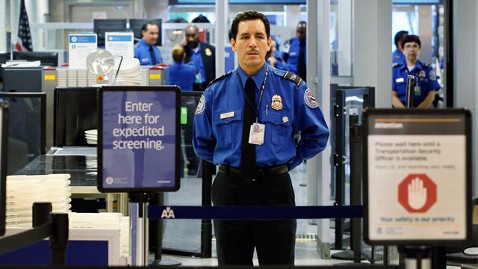TSA Head: Possible Hiring Freeze Before Sequester Furlough

Joe Raedle/Getty Images
We've heard the doomsday scenarios of how automatic spending cuts from the sequester might impact airports: Travel Security Administration (TSA) workers could be furloughed, stretching security resources thin and leading to nightmarish lines and long waits at airport security checkpoints.
But the head of the TSA offered a glimmer of hope today, testifying on Capitol Hill that the agency might look to a hiring freeze before furloughs if the sequester goes into effect.
"The bottom line is, for us: We have been watching the whole sequester discussion closely and assessing what impact it will have for us," TSA head John Pistole told the House Appropriations Subcommittee on Homeland Security today. "We're doing other things before furloughing, so for example, we would look at a hiring freeze."
Federal employees being furloughed as part of the sequester must be notified at least a month in advance, according to guidelines from the Office of Personnel Management. That means if the sequester goes into effect this week, we could see a shortage of airport security officers starting in April, when TSA would furlough its 50,000 employee for up to seven days and cut back on overtime.
But if the TSA enacts a hiring freeze first, before resorting to furloughs, that could postpone the nightmare scenario Homeland Security Secretary Janet Napolitano warned against, writing in a letter to lawmakers, "Funding and staffing reductions will increase wait times at airports, affect security between land ports of entry, affect CBP's [Customs and Border Patrol] ability to collect revenue owed to the Federal Government, and slow screening and entry programs for those traveling into the United States. … The Transportation Security Administration would reduce its frontline workforce, which would substantially increase passenger wait times at airport security checkpoints."
Additionally, the FAA identified smaller airports that could take big hits if the sequester goes into effect - including 72 that could eliminate their overnight shifts and 238 air traffic control facilities that could be shut down altogether, Pistole said.
If the TSA implements a hiring freeze, its length would depend on how long the sequester is, Pistole said. He noted the TSA would still continue to process job applications during the freeze, so when the sequester comes and goes, the agency can be in a position to hire later this spring or summer.
The longer the sequester drags on, the more TSA will feel its impacts - and it's those busy summer travel months that will need the most security resources to keep things moving smoothly.
"When you think about holiday travel, and with spring breaks and summer travel coming up, the impact would be more noticeable, I think, longer-term as we look at our ability to surge resources to those busiest times," Pistole said.
Neither TSA nor DHS responded to calls about a timeline for when the hiring freeze or furloughs might occur under the sequester.
Lawmakers on Capitol Hill today continued to express frustration about the automatic, across-the-board cuts set to go into effect Friday - and the partisan bickering that got them there.
"I don't agree with it as a policy tool, or any other way. It's the wrong thing to do," said Rep. John Carter, D-Texas, chair of the Homeland Security subcommittee. "[In] my view, it's crude, pointless - reminds us all of the importance that we need to follow regular order in everything we do."
Ranking House Appropriations Committee member Rep. Nita Lowey, D-New York, agreed.
"It's disheartening that the majority has rejected Democrats' calls to prevent sequestration by closing tax loopholes and reigning in the growth of future spending," she said. "But I've always been an optimist, and I do hope reasonable people, such as those serving on this committee and others, can begin to work together to resolve this impasse that does such damage to its economy."